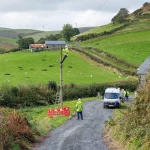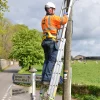Openreach Find “broad support” for Large Scale UK FTTP Broadband Rollout
After conducting an industry consultation Openreach (BT) has today claimed that ISPs offered “broad support” for their proposal to conduct a “large scale” rollout of Fibre-to-the-Premises (FTTP) ultrafast broadband across the UK, which could in theory reach 10 million premises by 2025. But no deal.. yet.
At present most of Openreach’s network across the United Kingdom remains dominated by slower hybrid fibre (FTTC) technologies, such as their ‘up to’ 80Mbps VDSL2 and the newer ‘up to’ 330Mbps G.fast service (only just starting to rollout), which mix fibre optic cable with less reliable copper lines that suffer signal degradation over distance (i.e. slower speeds on longer lines). FTTC solutions are quick to deploy and comparatively cheap.
On top of that the operator is also in the process of deploying their 1Gbps capable “full fibre” network, which uses significantly more expensive Fibre-to-the-Premises (FTTP/H) technology, to reach 2 million premises by 2020 (mostly new build homes and businesses). However the Government and Ofcom have been calling for more FTTP and so in July 2017 Openreach launched an industry consultation (here).
Advertisement
The consultation proposed a strategy that would aspire to reach 10 million premises with FTTP by around 2025, which they estimated could cost £300-600 per premises passed (total of between £3bn to £6bn); plus £175 – £200 to connect a customer. However they warned that this could only be done with support from the industry (ISPs) and key regulatory changes.
Openreach’s List of Enablers for Larger Scale FTTP
· Greater collaboration, including new investment, risk and cost sharing models.
· Agreement on how mass migration of customers onto the new platform can be achieved (Openreach proposes that all customers should be migrated over to the new network as quickly as possible after it has been built in a given area).
· Reducing logistical barriers, like improved planning and traffic management processes.
· Agreement on the right way to spread the costs of a FTTP investment.
· A legal and regulatory environment which encourages investment.
The challenge here is with the difficulty of marrying the industry’s many competing interests and turning that into some sort of workable agreement, which is essential in order to avoid future legal and competition disputes. Ofcom has similarly said that a “key test” of their new regulatory approach (Strategic Review agreement with BT) will be whether or not Openreach can “do a co-investment deal with another operator“.
Sadly Openreach’s update doesn’t announce a specific agreement and instead sets a more general tone for their future direction, which still has many hurdles to overcome. Apparently “most” of the ISPs that responded (e.g. Sky Broadband, BT, TalkTalk, Vodafone etc.) said they “expect Britain’s existing broadband technologies to provide enough speed for the majority of consumers,” but no consensus was found on when Gigabit speeds will be needed.
Nevertheless the ISPs did agree that “ultimately a large-scale FTTP network will be a necessity” and, given the time-scales involved in building that network, there is said to be “strong support” for Openreach to start the engineering work required “sooner rather than later“. Several ISPs also expressed interest in sharing the risk of investment, albeit in return for “preferential terms on the infrastructure that’s built.”
Advertisement
However Openreach has so far not been able to reach agreement on how the investment costs can be fairly recovered, as well as any required changes to the regulatory environment (e.g. changes to business rates and wholesale rules/charges) and the operator says that it is also working to prove that it can build FTTP “at scale for a competitive cost” (their on-going rollout should help with this).
Interestingly Openreach said that ISPs “acknowledge that charging a large premium for ultrafast services alone is unlikely to succeed, but question how much more customers will be willing to pay for the same headline speeds on a better platform.” Rival ISPs may be unwilling to accept a solution that doesn’t enable them to offer a mass market affordable package or support some degree of wholesale control to help differentiate their products
The consultation also found strong support for a “switchover” approach to FTTP that would migrate all customers onto the new platform – and retire the old one – as quickly as possible after it has been built in a given area. But they warned that the “operational complexity and cost of such a programme would be significant.”
Clive Selley, CEO of Openreach, said:
“We believe that under the right conditions, we could build FTTP connections to ten million homes and businesses by the mid-2020s. We want to do it, we think it’s the right thing to do for the UK, but it’s clear that we can’t do it alone, so I’m encouraged to hear that our wholesale customers support our vision.
Having said that, we’re under no illusions about the challenges that lie ahead because we need to build a business case that’s workable and fair for everyone. That means we need a regulatory environment that encourages investment, and we need to agree how the costs of such a huge engineering project can be recovered fairly from all those that stand to benefit.
Of course that’s going to be tough, but we need to get into the detail of that now with our customers, with Ofcom and with Government. I believe Openreach has a critical role to play in achieving such an ambitious goal, and the prize for our CP customers, their customers and the UK as a whole could be huge.”
The trouble is that Ofcom may be part of the problem. The regulator tends to focus on maintaining low pricing for consumers via strict regulation, which is something that even the Government warns may make it difficult to develop an investment model for “full fibre” services (here).
Advertisement
By contrast Openreach clearly wants more flexibility to recoup their investment (e.g. higher wholesale prices) and support for a plan to switch-off their old copper network as the new FTTP is rolled out, which requires that years of complex rules be examined (these have built-up around copper lines). On the upside they do at least appear to have some support from ISPs that have invested heavily in that copper, such as TalkTalk and Sky Broadband.
One report in August 2017 did suggest that Vodafone, which hasn’t been back in the country’s residential market for very long, had proposed a “serious” co-investment deal as part of the consultation (here). Vodafone allegedly demanded a degree of exclusivity over any jointly built infrastructure (e.g. initial sole use of the infrastructure and first access to the fastest speeds), which might upset rivals and Ofcom.
The problem for Vodafone is that they have no real scale in the residential fixed line market and would need to gobble a rival in order to get that. At the same time anybody hoping that this will bring FTTP to rural areas should consider that the high cost of deployment, as well as commercial interests, will ensure that for many years most of it remains staunchly focused upon urban areas (give it a decade or two).
So what of Sky Broadband and TalkTalk? At present TT doesn’t have a lot of money to spare and so they could only be a minor partner in any co-investment arrangement. Meanwhile Sky does have the money but they seem happy to buy whatever Openreach builds, not to mention that the potential purchase by FOX also highlights a degree of uncertainty about their future direction in the broadband market.
Openreach could of course choose to continue ploughing the hybrid fibre route, although over time this might come under increasing pressure from rival FTTP providers and Virgin Media’s expansion (FTTP ISPs already offer Gigabit speeds and Virgin’s DOCSIS 3.1 upgrade should eventually do the same). Not to mention that future 5G fixed wireless links might also challenge hybrid fibre, but that’s still a long way off.
Openreach now intends to develop a new network strategy based on the feedback, which they hope to publish by the end of 2017 and this will then be subject to a further consultation.
Mark is a professional technology writer, IT consultant and computer engineer from Dorset (England), he also founded ISPreview in 1999 and enjoys analysing the latest telecoms and broadband developments. Find me on X (Twitter), Mastodon, Facebook, BlueSky, Threads.net and Linkedin.
« Twisted Light Wireless Optical Broadband Could Make Fibre Optics Obsolete

















































Comments are closed